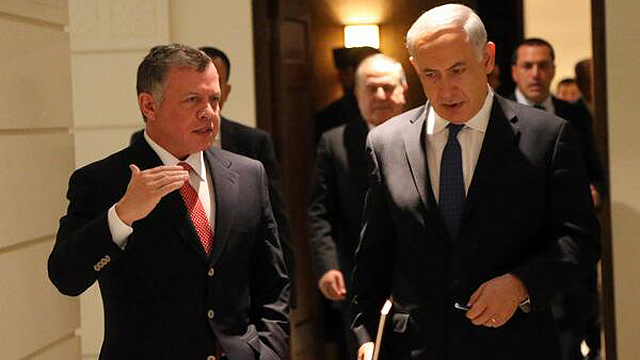
'Netanyahu, gave green light for Gaza's reconstruction to keep next conflict away'
צילום: AP
Netanyahu's win is convenient for Arab leaders
Analysis: The Egyptian, Jordanian, Saudi and Gulf state rulers trust Israel's re-elected prime minister to handle the Iranian issue, and the Americans to pressure him on the Palestinian issue.
As always, everything has to do with everything: After he finally telephoned Prime Minister Benjamin Netanyahu, US President Barack Obama sat in front of the cameras to record a special message to Iran's ayatollahs for the Nowruz holiday.
"For decades (since 1979), our nations have been separated," the president said from Washington. "We have an opportunity to pursue a different future between our countries" through a "reasonable deal."
Nowruz is an excellent excuse. It marks the beginning of spring and big hopes for the Persian New Year. Masses go out to the parks, eat till they burst and take selfies. An entire generation of young people in Iran is dreaming of emerging from the isolation.
Obama, in the recorded message, also speaks about unresolved differences of opinion. But after 18 months of negotiations, it doesn’t seem like Washington or Tehran will let the agreement slip out of their hands. Too many commercial interests and leaders' prestige are involved here and there. And also, we must admit, an unclear chance that they will succeed in sticking a finger and plugging the nuclear arms race.
The Arab world, just like officials in Jerusalem and in the IDF headquarters in Tel Aviv, is monitoring the steps of the American dance which is casting a shadow on the elections results here. One can definitely say that the roof did not collapse on the Arab leaders' heads when Netanyahu won. The elections here appeared odd, and if there was any attention, it focused on the joint Arab list, and that attention was limited too. Israel's Arabs are still perceived as a strange entity, sort of collaborators enjoying a democracy which was not born in their region. Despite the potential, there is no chance that they will head the bridge to peace.
So far, we haven't heard that Egyptian President Abdel Fattah al-Sisi or Jordan's King Abdullah telephoned Netanyahu to congratulate him. On the eve of the elections, al-Sisi actually told the Washington Post that he talks to Netanyahu "a lot." Abdullah is keeping quiet. He is stressed out because of the Islamic State which is sitting on his fences and the bloody clashes in Syria which are spilling very close to the Jordanian border. In recent days, Abdullah sent his foreign minister on an abrupt visit to Tehran. The last thing he needs is that the Revolutionary Guards' long hands in Iraq will approach the kingdom.
There is a lot of restlessness in the new king's palace in Saudi Arabia. Try to convince the White House that there is a huge difference between the Sunni majority in the Arab world and the Shiite minority which is pressing in Lebanon, fighting for Syrian President Bashar Assad, settling in Iraq and expelling the president from the palace in Yemen. Try to remind them that Saudi Arabia, rather than Iran, holds the key to the global oil market.
Obama's brief visit to Riyadh only raised the tensions. It was as if he came to the first wife to indicate that he has had enough of her, and he is about to take a new wife instead of her. He doesn’t mind leaving bleeding wounded on the ground and doesn’t care how much the deal will cost.
Despite the complaints in the Arab media, a Netanyahu-led right-wing government is very convenient for the Arab leaders. They trust him to do their job for them on the Iranian issue, and they trust the Americans to pressure him on the Palestinian issue.
It also guarantees that Israel will be isolated in the world. When Netanyahu promises that a Palestinian state will not be established on his watch, even if he did retract the statement in a way, they see themselves free of any open relations with us. There will be no normalization here in the near future.
Here is the insight of a veteran Arab commentator, who has been following us for decades: Netanyahu, he explains, has given the green light for Gaza's reconstruction in order to keep the next conflict away and neutralize the Iranians' long hands within Hamas. It's good for Egypt, it's excellent for Jordan and it's convenient for Palestinian President Mahmoud Abbas. It calms down the new king in Saudi Arabia and the Gulf emirates. It also provides a time-out until the agreement with Iran.











